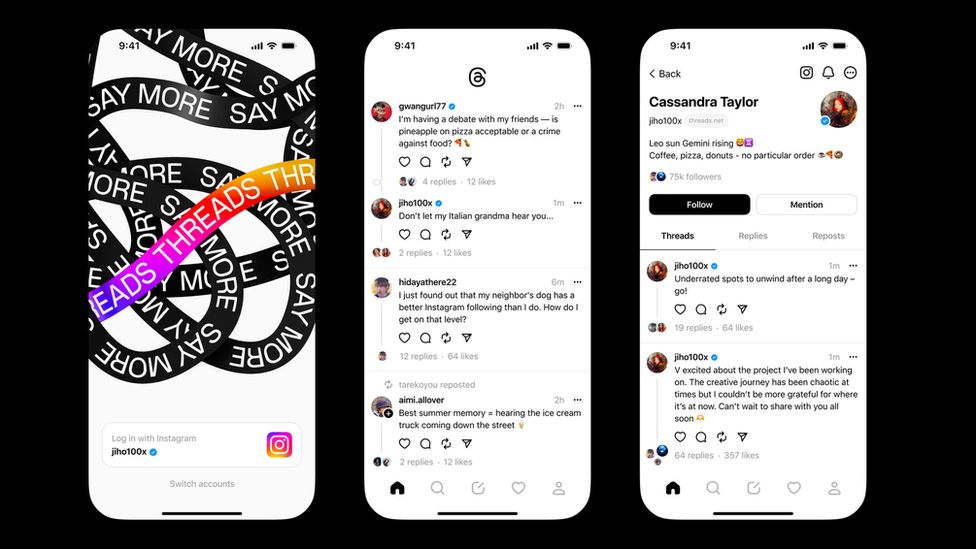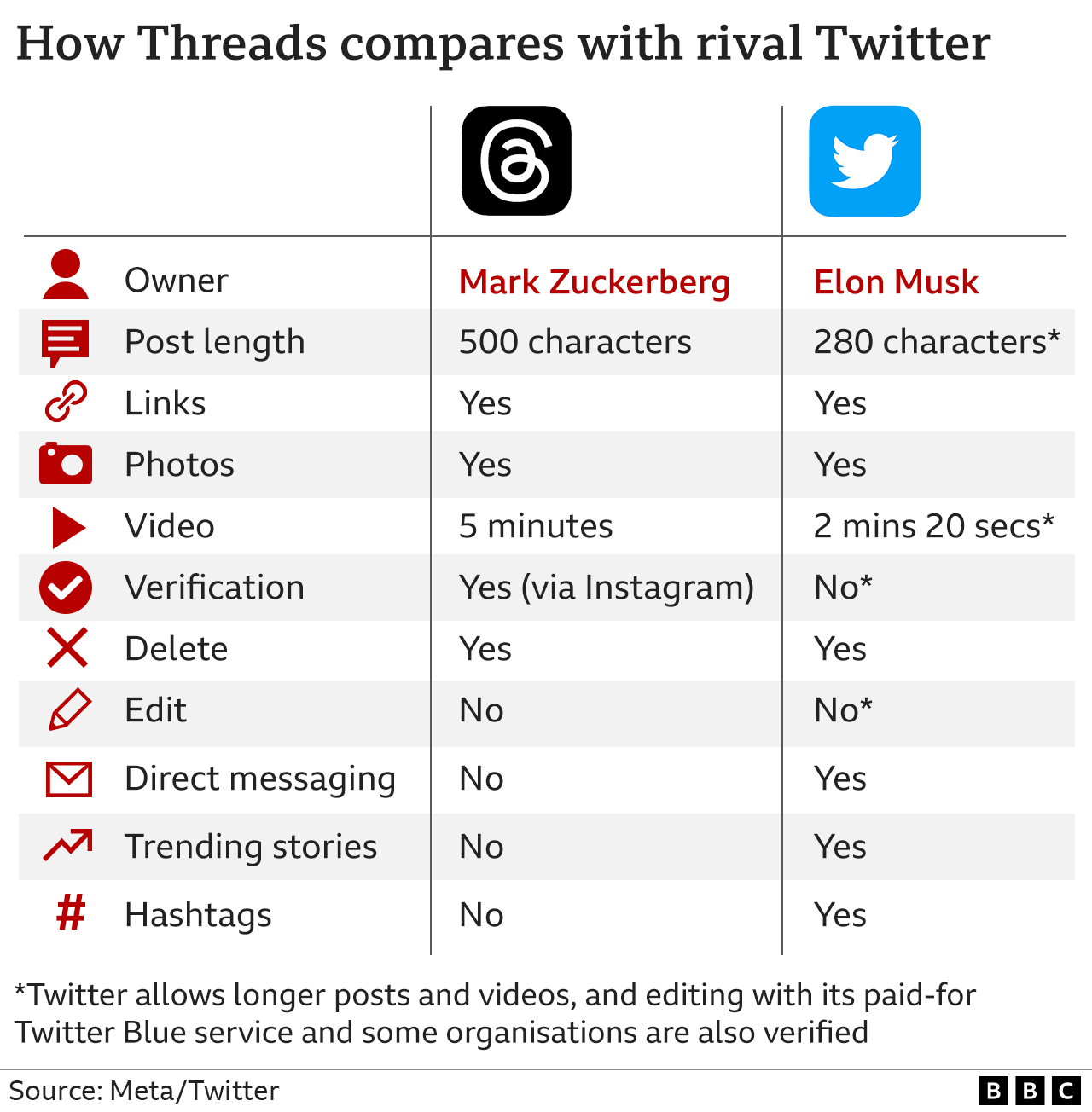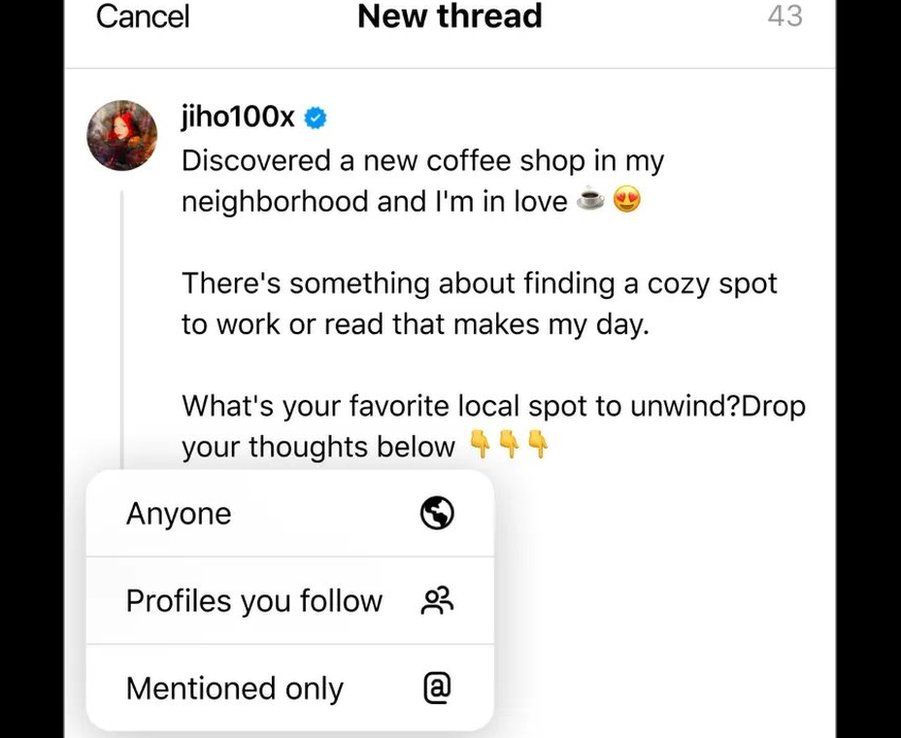Threads: Ten million join Meta’s Twitter rival, Zuckerberg says
-
Published

Ten million users signed up for Meta’s newly launched Threads app in its first seven hours, the company’s chief Mark Zuckerberg says.
He pitched the app as a “friendly” rival to Twitter, which was bought by Elon Musk in October.
Experts say Threads could attract Twitter users unhappy with recent changes to the platform.
Threads allows users to post up to 500 characters, and has many features similar to Twitter.
Earlier, Mr Zuckerberg said keeping the platform “friendly… will ultimately be the key to its success”.
But Mr Musk responded: “It is infinitely preferable to be attacked by strangers on Twitter, than indulge in the false happiness of hide-the-pain Instagram.”
When asked on Threads whether the app will be “bigger than Twitter”, Mr Zuckerberg said: “It’ll take some time, but I think there should be a public conversations app with 1 billion+ people on it.
“Twitter has had the opportunity to do this but hasn’t nailed it. Hopefully we will.”
Competitors have criticised the amount of data the app might use. This may include health, financial, and browsing data linked to users’ identities, according to the Apple App Store.
Some users have also expressed concern that it is not possible to delete your Threads profile without deleting the associated Instagram profile. Meta told the BBC: “At this time, you can’t delete your Threads profile without deleting your Instagram account. This is something we’re working on. In the meantime, you can deactivate your Threads profile at any time.
“Deactivating your Threads profile will not deactivate your Instagram account”.
Deactivation will mean your Threads profile, your posts and interactions with others’ posts won’t be visible, the firm added.
Users can download and delete Threads data by visiting their Instagram settings, Meta says.
Threads is now available to download in over 100 countries including the UK, but not yet in the EU because of regulatory concerns.
‘Initial version’
Meta, which owns Facebook and Instagram, called the new app an “initial version”, with extra features planned including the ability to interact with people on other social media apps like Mastodon.
“Our vision with Threads is to take what Instagram does best and expand that to text,” the firm said prior to its launch.
Despite Threads being a standalone app, users log in using an Instagram account. Their Instagram username carries over, but there is an option to customize their profile specifically for Threads.
Users will also be able to choose to follow the same accounts they do on Instagram, Meta says. The app allows users to be private on Instagram, but public on Threads.
The new app’s release comes after criticism of Meta’s business practices.
Last year, Meta whistleblower Frances Haugen said the company had put “profits over safety” and criticised how the platform was moderated.
The company was also rocked by a scandal in which it allowed third parties, including British political consultancy Cambridge Analytica, to access Facebook users’ personal data.
In an apparent reference to this controversial past, Mr Musk joked on Monday “thank goodness they’re so sanely run”.
There are several alternatives to Twitter available, such as Bluesky and Mastodon, but these have struggled to gain traction.
Threads has a significant advantage because it is connected to Instagram, and the hundreds of millions of users already on that platform.
How does Threads work?
On Threads, posts can be shared to Instagram and vice versa and can include links, photos, and videos of up to five minutes in length.

However, some early users on Wednesday reported problems when uploading images, hinting at teething problems.
Users see a feed of posts, which Meta calls “threads”, from people they follow as well as recommended content.
They are able to control who can “mention” them and filter out replies to posts that contain specific words.
Unfollowing, blocking, restricting or reporting other profiles is also possible, and any accounts users block on Instagram are automatically blocked on Threads.
While Meta stresses ties to Instagram, media coverage has focused on its similarity to Twitter, with some investors describing the app as a “Twitter killer”.

On Saturday, Twitter boss Elon Musk restricted the number of tweets users could see on his platform per day, citing extreme “data scraping”.
It was Mr Musk’s latest push to get users to sign up to Twitter Blue, the platform’s subscription service.
Twitter has also announced that its popular user dashboard TweetDeck will go behind a paywall in 30 days’ time.
Since Mr Musk took over, many users of Twitter have publicly expressed their dissatisfaction with the platform and his stewardship – citing erratic behaviour and political views.
Last month, Mr Musk and Meta boss Mark Zuckerberg agreed – possibly in jest – to a cage fight, and Mr Zuckerberg’s early posts on Threads mentioned his interest in mixed martial arts.
While Threads will be available in the UK, it is not yet available in the EU because of regulatory uncertainty, particularly around the EU’s Digital Markets Act.
But the company says it is looking into launching in the EU.
That act lays down rules on how large companies such as Meta can share data between platforms that they own. The sharing of data between Threads and Instagram is part of the issue.
Meta maintains protecting privacy is fundamental to its business.
Additional reporting by Max Matza and George Bowden
